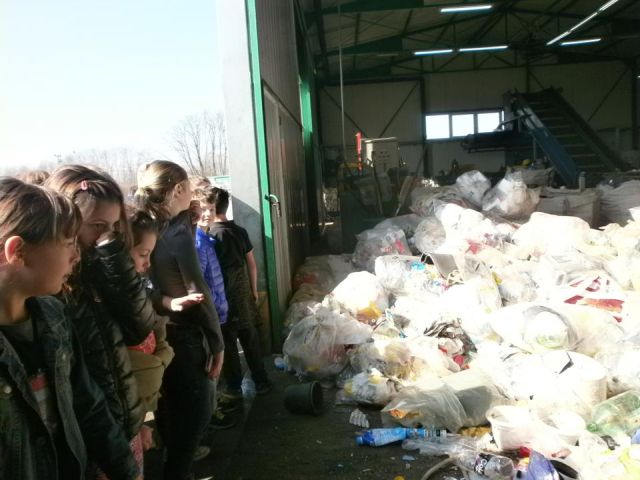Picture books: The Earth is God's and our home
During religion classes, the pupils in the 4th grade together with their teacher Anemari Vugrinec learned about the biblical account of creation, human beings responsibility as co-creators, God's traces in nature and ecology as part of the teaching unit The Earth is God's and our home. The pupils made picture books to revise the lesson content and put special emphasis on the ecology importance, the environment protection, recycling, sorting waste, decreasing noise and ecological commandments. The activities were part of the Erasmus+ project Ecological literacy, carried out by the First elementary school in Čakovec.
Marija Toplek, teacher, l. osnovna skola Cakovec
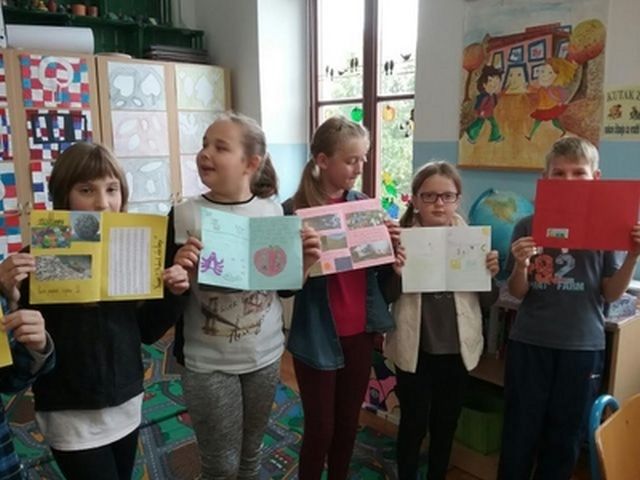
Izrada slikovnice: Zemlja je naša i Božja kuća
Učenici 4.a su na nastavi vjeronauka sa vjeroučiteljicom Anemari Vugrinec kroz nastavnu cjelinu Zemlja je naša i Božja kuća učili o biblijskom izvještaju o stvaranju svijeta, o čovjeku kao odgovornom su-stvaratelju svijeta, Božjim tragovima u prirodi te o ekologiji. Učenici su izrađivali slikovnice za ponavljanje nastavnih sadržaja gdje su posebno istaknuli važnost ekološkog djelovanja; brige za svijet koji nas okružuje, od razvrstavanja otpada, recikliranju, smanjenju buke i ekološkim zapovijedima. Učenici su navedene aktivnosti provodili u sklopu Erasmus+ projekta ELIT, provodi Prve osnovne škole u Čakovec.
Draženka Blažeka, učitelj, l. osnovna skola Cakovec
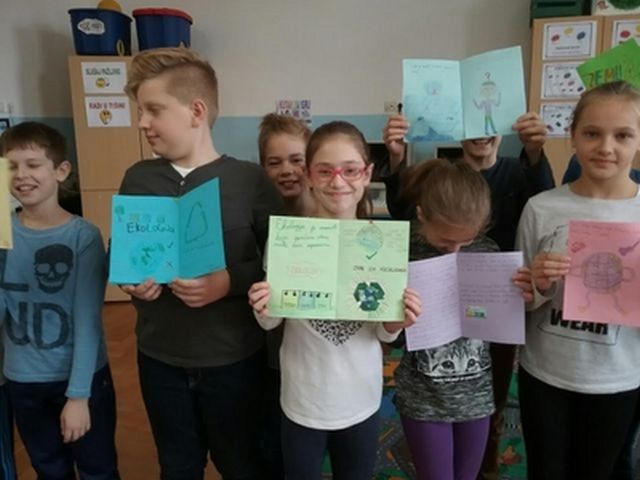
From Mud to Fountain, the Story of Water
After the semester holiday had ended, ecological detectives of the project workgroup of Vali M. Lutfullah Bilgin Secondary School had the opportunity to learn the story of water thanks to the documentary trip to Gaziantep Metropolitan Municipality Water Treatment Facility. The group took the road after a short introductory briefing about phases of water treatment in Ecological Building. As we got closer to the facility, the chimneys among the garbage hills which were used to burn methanol, were welcoming us. Pupils had the idea of how the waste water which was called as black water at first, turned into drinkable clean water with the presentations by environmental engineers. We learnt that after the solid waste in the black water is removed mechanically, organic waste is piled to produce methanol; while water is transferred to pool, being treated chemically. Heat energy produced by the burning of methane gas obtained by waste storage, was being converted to electrical energy by steam turbines. The energy amount generated in the facility was enough to support the needs of 10.000 houses. The most useful outcome of the trip to water treatment facility was the fact that pupils discovered inorganic waste like paper, glass, plastic, etc. couldn't be recycled in such facilities; instead it was buried and left to be rotten. Ecological detectives, who learned that the only place for inorganic waste to be treated was recycling facility, left the facility by determining to be more conscious about the subject and train their families as well as those around them. The next step for us will be the recycling plant where inorganic waste is treated.
Fatma Karadoğan, teacher, Vali Mehmet Lutfullah Bilgin Ortaokulu
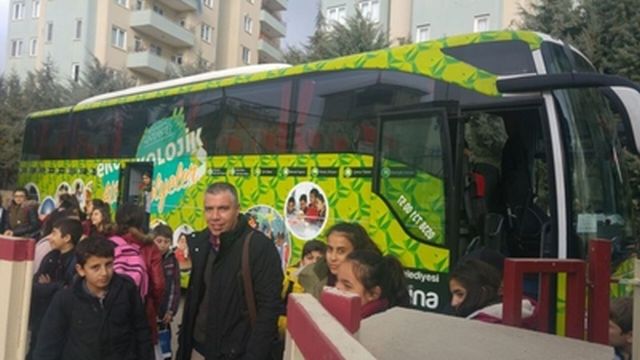
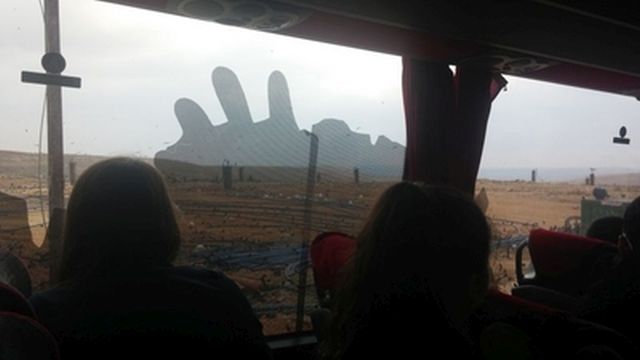
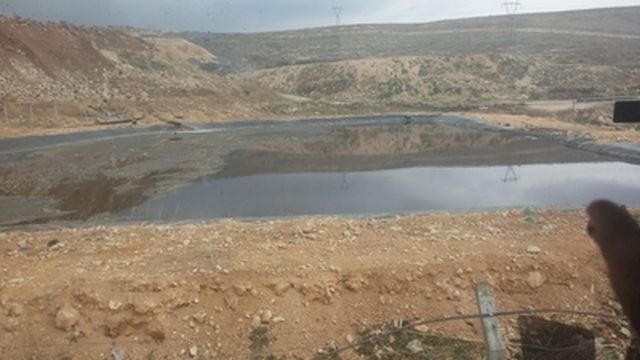
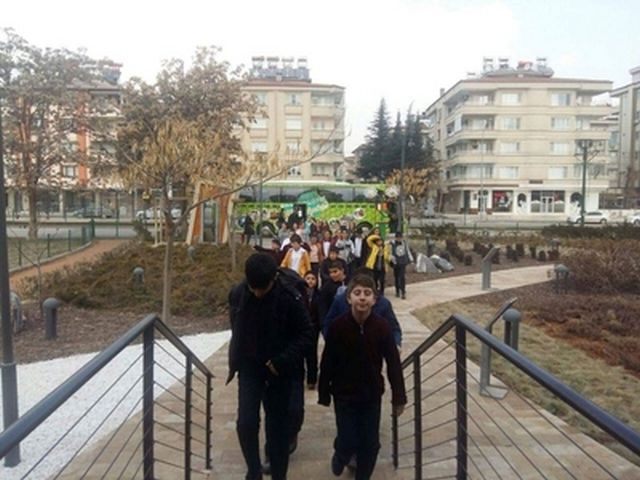
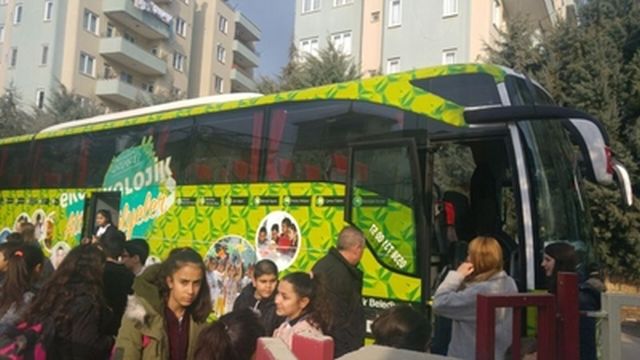
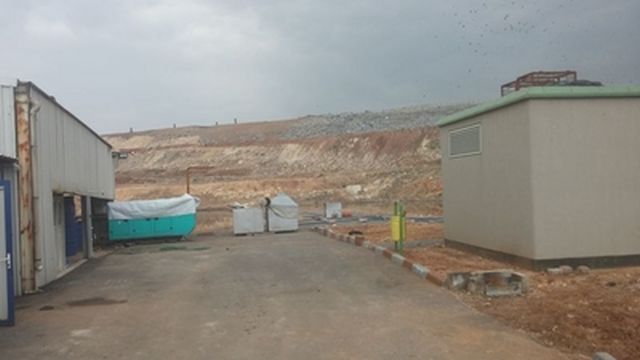
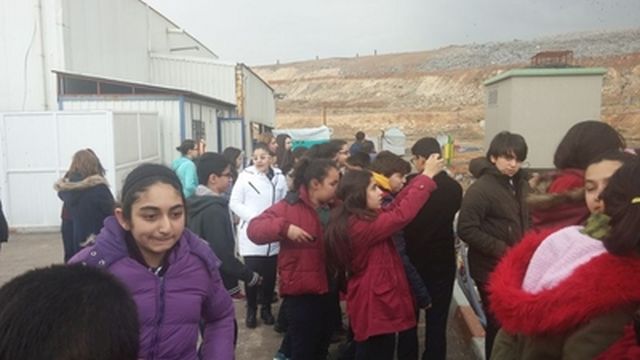
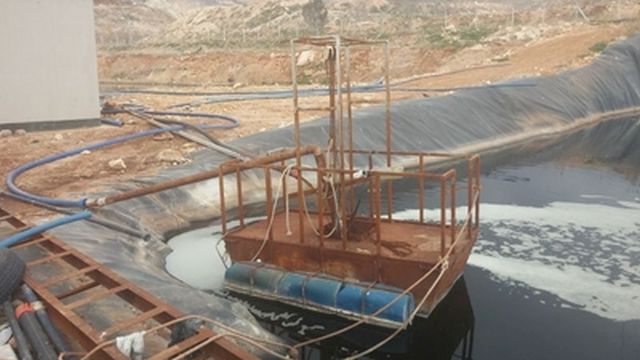
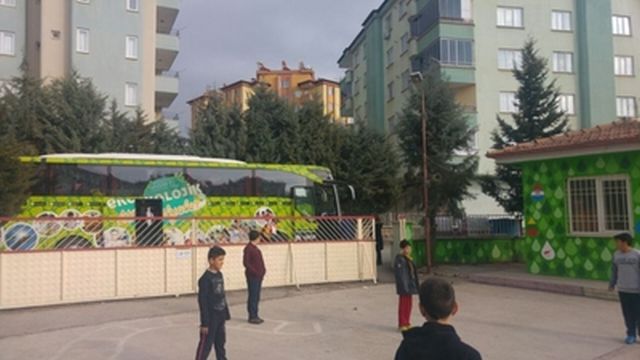
Çamurdan çeşmeye, suyun hikâyesi
Yarıyıl tatili dönüşü, Vali M. Lütfullah Bilgin Ortaokulu proje çalışma grubunun ekolojik detektifleri, Gaziantep Büyükşehir Belediyesi Su Arıtma Tesislerine düzenlenen geziyle suyun hikayesini öğrenme fırsatı buldu. Ekolojik Bina’da suyun temizlenme aşamalarıyla ilgili tanıtıcı sunumun ardından, tesise doğru yola çıkıldı. Tesise yaklaştığımızda çöp dağlarının arasında, metan gazının yakıldığı yüksek bacalar bizi karşılıyordu. Görevli çevre mühendislerinin yaptığı kapsamlı sunumlar sonrası, öğrencilerimiz kara su olarak tabir edilen atık suların hangi aşamalardan geçtiğini ve nasıl içilebilir hale geldiğini öğrendiler. Sudaki katı atıkların mekanik olarak ayrıştırılmasından sonra, suyun kimyasal işlemlerden geçirilmek üzere havuzlara aktarılırken; organik atıkların metan gazı üretimi için yığın haline getirildiğini öğrendik. Elde edilen metan gazının yakılmasıyla üretilen ısı enerjisi buhar türbinleri vasıtasıyla jeneratörleri çalıştırarak elektrik enerjisi üretmekteydi. Tesiste üretilen elektrik enerjisi, 10.000 hanenin ihtiyacını karşılamaya yetecek miktardaydı. Arıtma tesisine düzenlen gezi sonucu en büyük kazanım, öğrencilerin kâğıt, plastik, cam gibi organik olmayan atıkların bu tip tesislerde değerlendirilemediğini ve toprağa gömülerek çürümeye bırakıldığını öğrenmiş olmalarıydı. Bu tip atıkların tekrar kazanılabileceği tek yerin geri dönüşüm tesisleri olduğu konusunda bilinçlenen ekolojik dedektifler, bundan sonra ailelerini ve arkadaşlarını geri dönüşümün gerekliliği hakkında eğitmeye karar vererek tesisten ayrıldılar. Bundan sonraki durağımız organik olmayan atıkların geri kazanıldığı geri dönüşüm tesisi olacak.
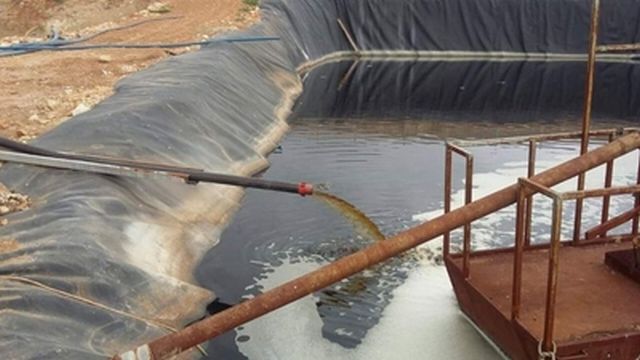
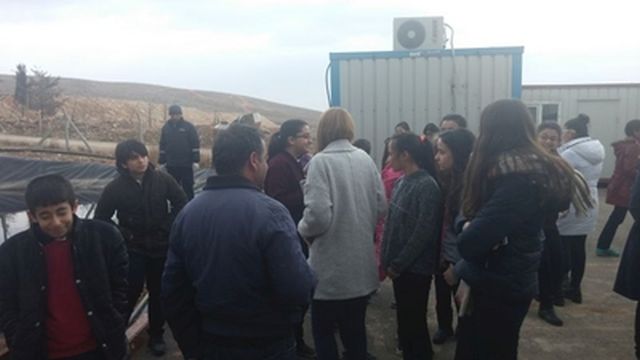
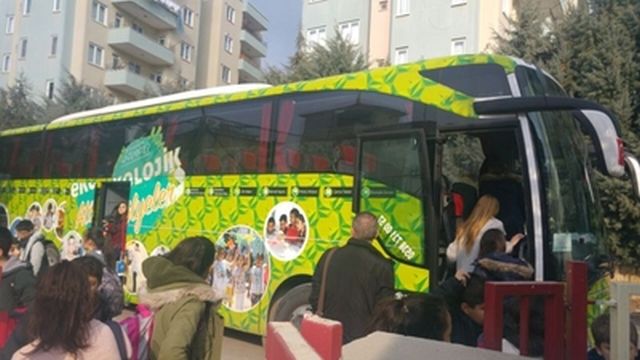
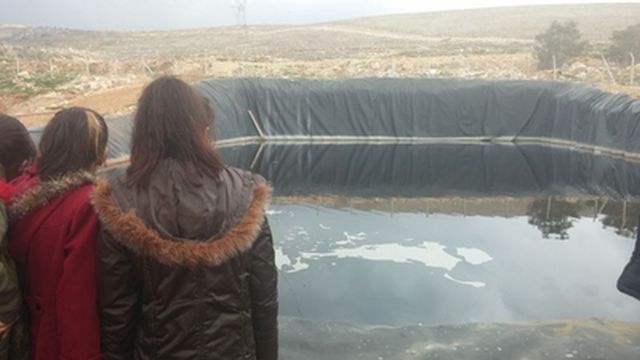
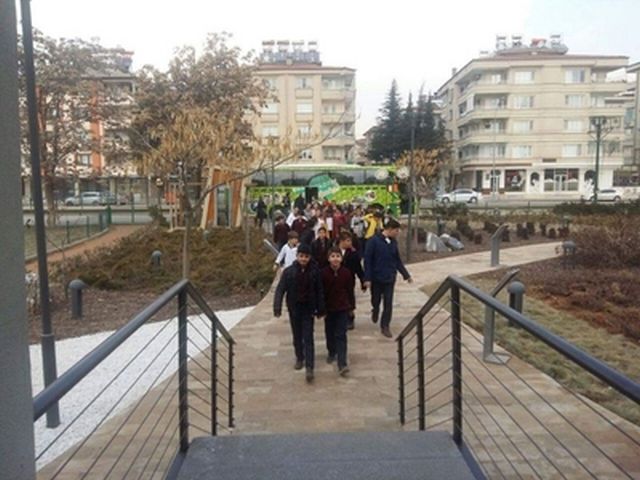
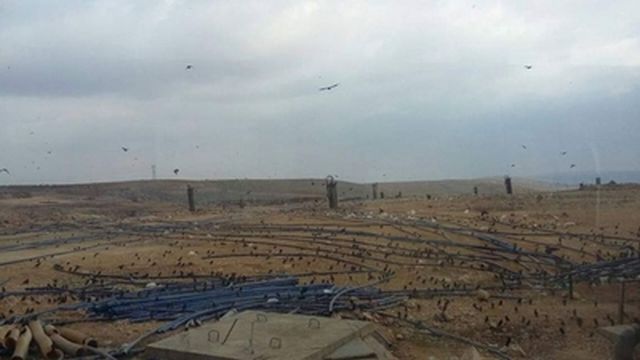
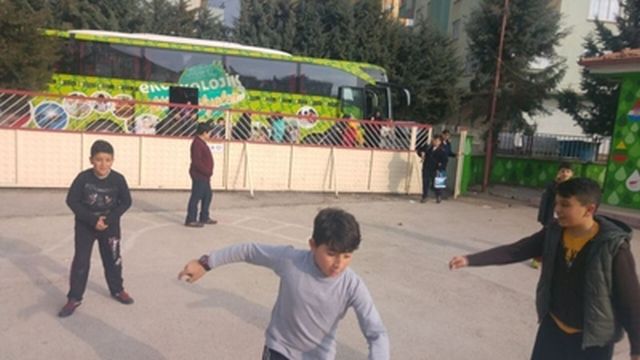
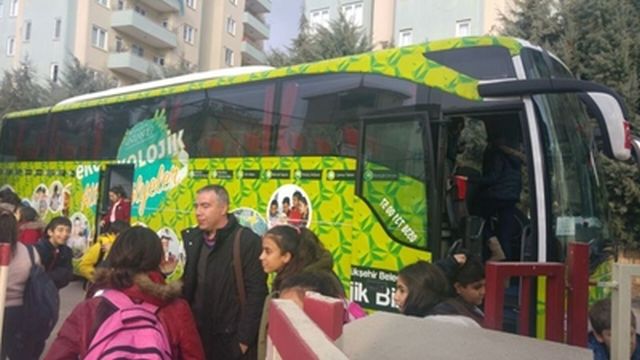
Esra Guzeltaș, öğretmen, Vali Mehmet Lutfullah Bilgin Ortaokulu
VISITING GREEN DOT
On Tuesday 07/02/2017, a group of teachers and their students of our Erasmus+ project team, after attending a conference about the Safety on the Internet, have visited the non-profit organization called "Green Dot" from Nicosia. "Green Dot" is a packaging and packaging waste management system. There we have learned a lot of things about recycling.
Filippos Yiapanis, pupil, Gymnasium Apostolou Paulou in Paphos
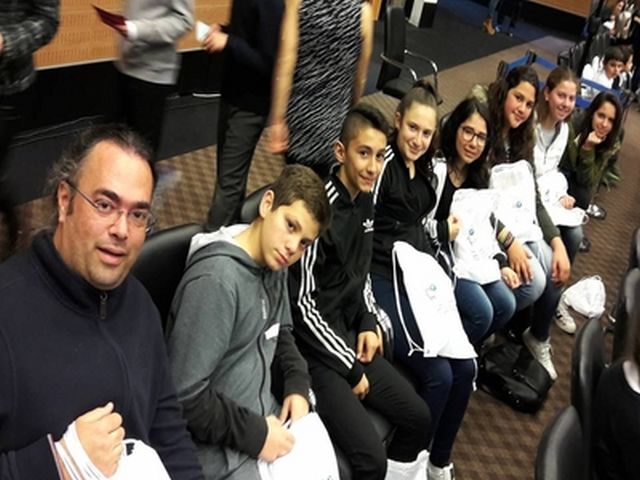
ΕΠΙΣΚΕΨΗ ΣΤΗΝ GREEN DOT
Την Τρίτη, 07/02/2017 μια ομάδα μαθητών και καθηγητών που συμμετέχουν στο πρόγραμμα ERASMUS+ του σχολείου μας, αφού έλαβε μέρος σε συνέδριο για την ασφάλεια στο Διαδίκτυο, επισκέφτηκε την εταιρεία Green Dot στη Λευκωσία. Η Green Dot είναι ένα Συλλογικό Σύστημα Διαχείρισης Συσκευασιών και Αποβλήτων Συσκευασιών. Εκεί μάθαμε πολλά σχετικά με την ανακύκλωση.
Alexandros Kofteros, μαθητής, Gymnasium Apostolou Paulou in Paphos

Where Did My Plastic Bag End?
School subject Nature and Society teaches us about environmental preservation, about sorting of garbage and waste, about taking care of environment that we live in but also about garbage that is not garbage. By recycling and reprocessing we preserve natural resources for new generations of students like us. The students of grades 3A, 3B, 3C and 3D learned about the activity of the Waste landfill in Totovec. They saw the waste sorting line from which dozens of cartons, plastic came out. They learned that 60 tons of garbage arrive in the landfill every single day, but also that it can only operate until 2020. "And then what?", we wondered.
http://os-prva-ck.skole.hr/projekti/ecological_literacy?news_hk=5774&news_id=2165&mshow=1353#mod_news
Ivana Ružić, Erasmus+ school coordinator, l. osnovna skola Cakovec
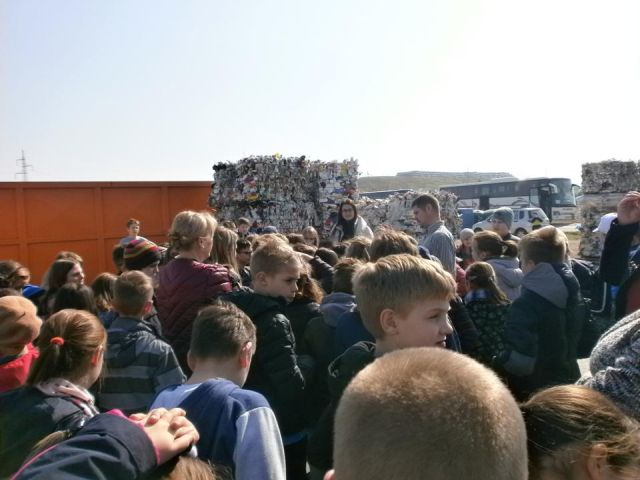
Gdje je završila moja plastična vrečica?
Priroda i društvo, uči nas o čuvanju okoliša, o razvrstavanju smeća i otpada, o brizi za okoliš u kojem živimo ali o smeću koje nije smeće. Recikliranjem i ponovnom preradom čuvamo prirodne resurse za nove generacije učenika kao što smo mi. Učenici 3.a, b, c i d razreda upoznali su se sa djelatnošću Odlagališta otpada u Totovcu. Vidjeli sortirnicu otpada iz koje izlaze bale tetrapaka, plastike,... Saznali da svakodnevno stiže 60 tona smeća ali da i naše odlagalište može raditi tek do 2020 godine. „A što onda?”, pitali smo se.
Jelena Kovačić, pupil, l. osnovna skola Cakovec
